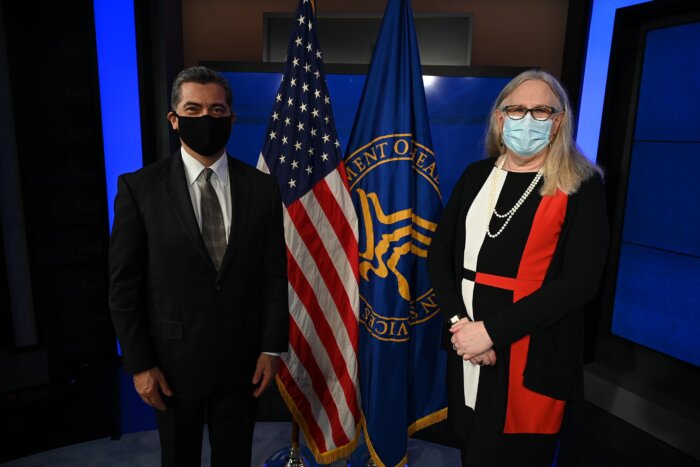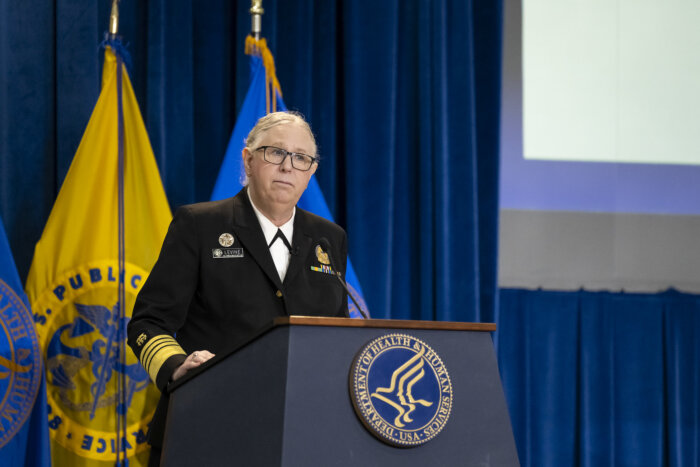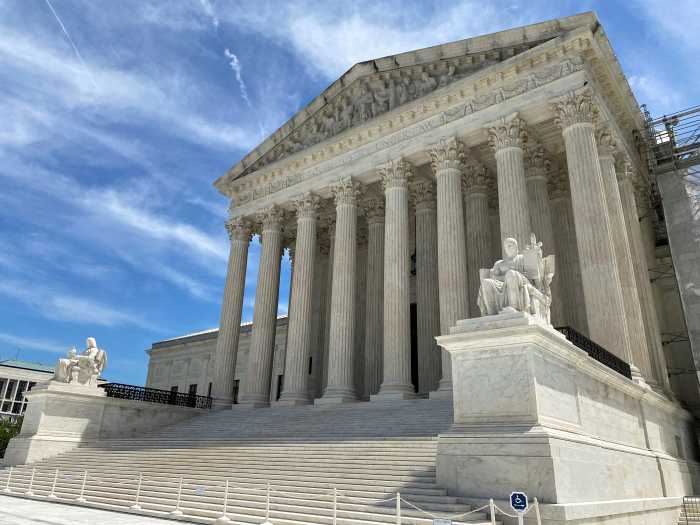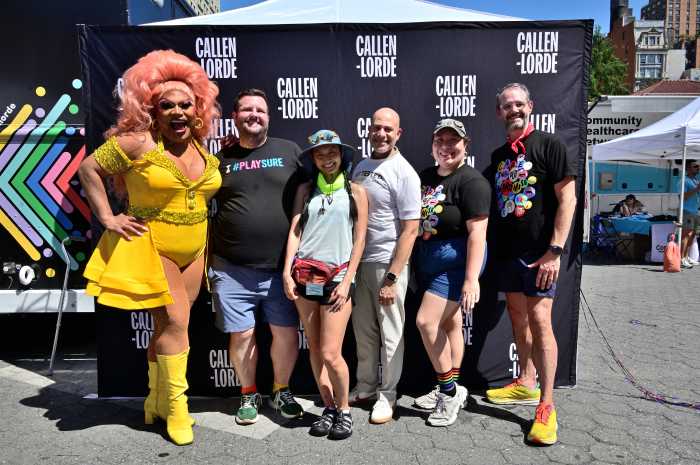These days, US Assistant Secretary of Health Rachel Levine is one of the top health officials in the federal government — and the first out trans official to gain Senate confirmation — but when she reflects on her fulfilling career, she vividly recalls a time many years ago when she was just getting started at Mount Sinai in Manhattan.
It was the 1980s and Levine, a young doctor-to-be, had recently graduated from Harvard College and Tulane University School of Medicine. She had just embarked on her residency in pediatrics and adolescent medicine at Mount Sinai when she was thrust into the HIV/AIDS crisis at a time when health officials were still trying to learn more about it.
Levine remembers seeing newborns and young infants die with opportunistic infections like pneumocystis pneumonia — and then those children’s mothers would die of the same thing, and sometimes their fathers, as well. She would see teenagers and adults alike enter the hospital and subsequently die.
“During my residency program, the HIV/AIDS virus was characterized, so we started to know — but there was nothing we could do,” Levine told Gay City News in a one-on-one interview. “We were petrified of needle sticks. There were nurses who contracted HIV and died, so it was devastating and it was heartbreaking.”
The sobering experience, unanticipated as it was, represented Levine’s first foray into a career in healthcare that included serving as Pennsylvania’s health commissioner before rising to a key post in the federal government’s Department of Health and Human Services. In 2021, Levine made history when she became the first out trans federal official after she was nominated by President Joe Biden and confirmed in a 52-48 bipartisan vote in the Senate. She also heads the US Public Health Service Commissioned Corps, which is one of the eight uniformed services.
“It’s been a really incredible and unique and rewarding experience,” Levine said. “All I do is get to help people from a public health perspective nationally. Our vision at the Office for the Assistant Secretary of Health is a healthy nation for all.”
During her confirmation hearing, Levine faced hostile and, at times, transphobic questioning from senators like Rand Paul of Kentucky, who voted against confirming Levine and peppered her with questions casting doubt on gender-affirming care. But Levine said she was ready because Biden’s team made sure she was prepared in advance.

In March, Levine marked three years since she was officially confirmed by the Senate — and her work has, in some ways, come full circle: Among her many duties include focusing on new and emerging tools in the fight against HIV/AIDS, including injectable PrEP, and she is emphasizing the need to prioritize prevention and treatment for populations facing the greatest need.
“I was there at the beginning and I want to be there at the end,” Levine said. “We are working very hard — at our office, the CDC, NIH, and all the different divisions.”
Levine is also stressing the need to protect transgender youth at a time when many states have passed laws targeting gender-affirming care for youth. And she has fended off personal attacks from the likes of anti-LGBTQ figures like Congressmember Marjorie Taylor Greene of Georgia, who once deadnamed Levine and made hateful remarks about her on social media while stoking fear and lies about gender-affirming care for youth.
Such hatred, Levine said, compounds the health issues youth are already facing following the emergence of a COVID pandemic that had a significant impact on education, the workforce, and other areas of society.
“Youth in general, coming out of the key phase of the pandemic, are having significant mental health issues,” Levine explained. “The surgeon general talked about that. Youth mental health is a challenge in general, but we have a lot of specific challenges for LGBTQIA+ youth, particularly vulnerable trans and non-binary youth and their families and providers.”
Levine further added that there is a dire need for policies aimed at bolstering gender-affirming care, but that effort is complicated by the tremendous amount of misinformation and disinformation about trans medicine — as well as the regressive laws being passed in one state after another.
“I have said trans medicine is healthcare,” Levine said. “It is literally suicide prevention care and it has been shown to improve the quality of life and save lives. Trans medicine for youth has evolved over the last 10 to 20 years and it is not different from any other medical care. You have evidence-based guidelines that have been vilified.”
Levine also made it a point to say how much the legislative attacks have imposed limitations on doctors who have been barred by law from providing medically necessary care for their patients. She said she has visited with youth and families, as well as their providers, all over the country.

Among other initiatives, Levine’s office has developed a resource to guide parents, guardians, educators, and others involved in the lives of children and adolescents on what gender-affirming care is and why it is important to the well-being of trans, gender non-conforming, and non-binary youth, according to the White House.
“We’re going to continue to work on this, the secretary has spoken out, the vice president has spoken out, and the president, as well.”
Levine also pointed to HHS’ work to bring hundreds of millions of dollars in funding to build out the 988 Suicide and Crisis Lifeline, which is a national network of crisis centers providing free and confidential emotional support for people in distress.
When people call the number, Levine said, they can simply press 3 to speak with a trained LGBTQ-affirming counselor.
“LGBTQ youth mental health is absolutely a priority for me,” Levine said.
In the meantime, though, states are continuing to move forward with an onslaught of anti-trans policies. In the final days of March, for example, Idaho Governor Brad Little signed legislation barring trans youth and adults on Medicaid from receiving gender-affirming care, while Wisconsin narrowly avoided becoming the latest state to sideline trans student-athletes after Governor Tony Evers vetoed a bill barring trans student-athletes from participating in sports in accordance with their gender identity.
The attacks on youth hit especially close to home for Levine given her background in adolescent care. After completing her residency at Mt. Sinai, she went on to teach as a professor of pediatrics and psychiatry at the Penn State College of Medicine. She also served as vice-chair for clinical affairs for the Department of Pediatrics and chief of the division of adolescent medicine and eating disorders at the Penn State Hershey Medical Center.
In 2015, she was tapped by Pennsylvania Governor Tom Wolf as the physician general of the state before becoming the Pennsylvania health commissioner three years later.
Now, though, Levine is at the pinnacle of her career — but with Biden’s future in limbo during an election year, her job is not assured beyond January of next year. Until then, she is vowing to do the best she can in her government capacity to be an unwavering supporter of the LGBTQ community during a time of fierce adversity.
“I’m very pleased to serve as a role model and advocate for the LGBTQIA+ community,” Levine said. “My goal is to pave the way for many more to come out so people don’t have to talk about the ‘trans’ assistant for health — it’s just me in this position.”


































